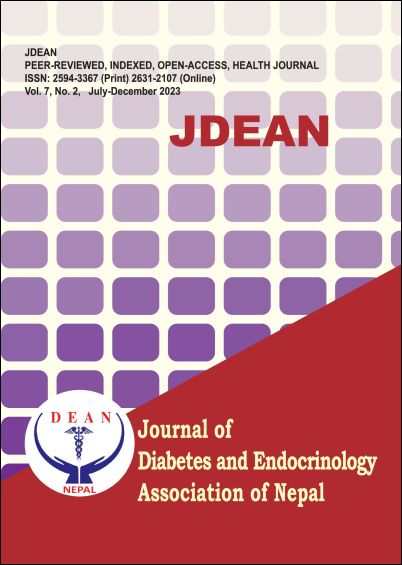Kisspeptin levels in polycystic ovary syndrome and its manifestations
DOI:
https://doi.org/10.3126/jdean.v7i2.63894Keywords:
Polycystic ovar syndrome, Kisspeptin, Luteinizing hormone, Follicle stimulating hormoneAbstract
Background: The altered luteinizing hormone to follicle-stimulating hormone (LH/FSH) ratio- an important component in the pathogenesis of polycystic ovary syndrome (PCOS), is regulated by a brain peptide kisspeptin. This study aimed to explore the association of serum kisspeptin levels with PCOS and its manifestations.
Methods: This cross-sectional study included 80 participants with PCOS on the basis of International evidence-based guidelines, 2018, and 71 healthy matched controls. Along with clinical information, fasting blood was drawn to measure total testosterone, sex hormone binding globulin, thyroid stimulating hormone, prolactin, 17-hydroxyprogesterone, and kisspeptin in all, and glucose, lipids, insulin, LH, FSH in only PCOS participants in the follicular phase of the menstrual cycle. Kisspeptin was measured by sandwiched enzyme-linked immunosorbent assay method with a lower limit detection level of 0.01 pg/mL.
Result: Kisspeptin levels were undetectable in 25 out of 80 and 16 out of 71 controls. Among the participants with detection levels (55 in each group), kisspeptin did not differ between PCOS and control [31.2 (19.2 – 43.1) vs. 40.4 (14.9 – 70.4), pg/mL, p=0.446]. Among participants with PCOS, kisspeptin levels had no significant associations or correlations with any manifestations (ns for all). ROC curve analysis showed kisspeptin as not an acceptable marker for PCOS [AUC (95% CI): 0.57 (0.46 – 0.68), p= 0.221].
Conclusion: Our study failed to show any association of kisspeptin levels with PCOS and its manifestations.
Downloads
Downloads
Published
How to Cite
Issue
Section
License
Copyright (c) 2023 The Author(s)

This work is licensed under a Creative Commons Attribution-NonCommercial 4.0 International License.
This license enables reusers to distribute, remix, adapt, and build upon the material in any medium or format for non-commercial purposes only, and only so long as attribution is given to the creator.




